Share

This Sustainable Life
337: Why we feel miserable under lockdown
Ep. 337
•
I discuss the connection between perceiving lack of variety in food made from scratch and feeling miserable and bored under lockdown, despite having access to all the world's art, music, literature, and culture ever recorded and more material abundance than kings only a few generations ago, despite our material abundance being only slightly less than a few months ago.
Here are the notes I read from for this episode:
- Yesterday recorded episode with Rob and my stepfather
- Talked about food variety, said mine lacked variety
- Only tried three times
- People always see theirs as varied, others as not
- People say I don't like Chinese or Indian, billions, huge variety
- I see McDonald's and Taco Bell as same
- Count Chocula versus Froot Loops
- I made something with broccoli versus zucchini or cauliflower as different
- I see industrial food as the salt, sugar, fat, convenience treatment
- Add sugar versus add salt, people see as different, but to me corn flakes and Fritos are basically the same
- Supermarket carries same things year-round. Seems like variety because at any given moment lots of choices
- But once the prime pleasure becomes salt, sugar, fat, convenience, same to me.
- Because there's the raw flavor, which can differ, but we've reduced that variety to monocrops so only a few varieties of mango here, despite abundance in nature, and zero radishes for most people
- To me variety among apples is huge, which I cherish
- German beer law -> abundance and just local ingredients is huge compared to their four
- People lived since dawn of our species on local ingredients
- When did we become so entitled that we should get anything we want whenever, wherever?
- What's so bad about not having berries every damn day?
- A farmer nearby wants to provide food for me and you
- Instead a large part of your money goes to Saudi Arabia for fuel, Madison Avenue for advertising, Wall Street for finance, and Venezuela for farmer now not feeding their people
- So my parents, who have lived here for over a decade, say there's nothing available local this time of year
- It's like someone who played loud music their whole lives to deaf saying there's no bird songs
- The human aspect is important to me. I would probably eat meat, which until just before this time of year would be our option, and we'd cherish it, not take it for granted and ship from all over the world
- Then treat with salt, sugar, fat, convenience
- So no, I don't consider Filet-o-Fish as different than a burger, nor Taco Bell as different from McDonald's, Olive Garden, etc
- They all treat the raw ingredients as commodities.
- I want to treat them as a painter treats paints on a palette or a musician treats notes on a scale. A piano has 88 keys. A trumpet three valves.
- No variety?
- Let's get to bigger picture.
- I've also come to see our educational system as equally tone deaf
- Some will see history as completely different subject than economics
- Or even humanities as different than science
- Even there, most humanities people will see math and physics similar
- Most science will see history and philosophy as similar
- To me, if they all teach the same skills of reading, listening, taking notes, analyzing how they teach to analyze, but not to learn their own values and create own skills, teaching the same compliance
- That most Americans or people in East and West, when confronted with new problem, can't help
- Mandela, in prison 27 years, lived more free in 10x10 foot cell with forced labor than people today.
- How do I know? Because he created his happiness despite few raw ingredients, yet people today with much more comfort, convenience, and variety feel depressed and bored.
- I learn from Thoreau, who lived off the land. Read Walden and Civil Disobedience. People today miss the point by saying he interacted with people. He found that being put in jail for not paying taxes to avoid
- supporting slavery and an unjust war made him more free.
- People who emerge from our educational system learn dependence, not independence. Rob complains about system and as best I can tell spends his time in solitude trying to find how someone is causing his problems rather than appreciating nature that no matter how we try to dominate it, will never go away nor be weaker than us.
- With zero evidence constructs a world view that Chinese labs were trying to hurt him. Mandela learned to relate with and help the people imprisoning him, realizing the problem wasn't the people, but the system
- People make themselves depressed, despondent, angry, and such unable to apply their compliance and analysis to understand a situation beyond what school taught.
- Victor Frankl lived a life of more happiness and bliss in Auschwitz, or Jean-Dominique Bauby, the guy from The Diving Bell and the Butterfly who suffured a stroke that led to him devoid of voluntary control of any muscles except his left eyelid and who wrote a book that became a bestseller and a movie that won awards, He did it by connecting with the people around him.
- They lived more variety and happiness than people today who want to riot when they only have access to all the food in the world, all the world's knowledge, video to anyone and everyone, all the art, music, literature, movies, ever recorded
- As well as the tools for themselves to recreate those works or even make their own
- So go ahead and call my bowl of cereal one day with a bartlett pear and the next with an anjou pear lacking variety while your Wheaties
- different than your Spaghetti-os, which I see as the same
- While you complain, plan to riot against people suggesting you live with slightly less material abundance than yesterday, by your own prideful boasting greater than kings of only a few generations ago, and sink into depression and rage
- Miss out on seeing that the same process happens with travel as with food. Just as they industrialize food to produce what superficially looks like variety but beneath the surface is monotony, people's actual experience of Italy versus China have become as different as different sections of Disney World, while they can't see the nuance between going on a bike camping trip versus spending a week to learn bike mechanics. Or they can't see that spending a week on a meditation retreat might change their lives more, despite probably less emissions, than crossing another item off a bucket list that is actually less photogenic than the million pictures on the net, that they degrade by going and also degrade where they came from.
- Or even as my stepfather describes meeting the people or the land in faraway places, while missing out that his very own childhood created
- the same results by going places on foot, miss out that the variety and diversity of people is everywhere.
- My greatest recent vacation was the day, just to see if I could, I got on my rowing machine and rowed a marathon---that is 26.2 miles.
- You would say I didn't leave my apartment and with disdain say I missed seeing Macchu Piccu or some other thing beyond my physical horizon, while I found myself, physically, emotionally, and made myself more able, more creative, less needy, physically, emotionally,
- intellectually.
- It wasn't just a day but a journey, since a month earlier I had rowed half a marathon for the first time, that feat a couple months after seeing people do it during the crossfit games, which I found researching a guest on my show who won the crossfit games after winning a gold medal in the Olympics, whom I met from another guest on the podcast from several months earlier who had won the Americas Cup, whom I met from learning to sail, which I learned to cross the Atlantic because I challenged myself not to pollute by not flying.
- While most Americans seem unable to put two and two together to see the opportunity to create the joy, happiness, bliss, community, and
- connection that someone the Nazis tortured, that Apartheid tortured, and whose stroke deprived of voluntary control created.
- You think they're dead. Some of you probably think they're dead white males, as one entitled student described my heroes including Mandela, MLK, and Gandhi. I find them more alive than probably you find alive most of your Facebook connections including possibly your spouse, as Rob tells me many people are looking to divorce as they meet their partners more.
- So go help bankrupt your local farmers, saying they can't provide you with food in the winter and help support despotic regimes and a system making more despotic regimes, lying to yourself that you aren't contributing to it
- And lament that after the vaccine everything will return to normal despite connecting with people around you more, as the guy I mentioned to Rob that my step-father and I talked to yesterday told of finally learning that his son was languishing in school, but flourished when his own father actually spent time with him.
- His father said he wouldn't go back to the old way.
- He could have learned about his son any time. Why didn't he? He was busy. He had time for things not his son but not his son.
- Compliance-based education may have resulted in a child getting an A, but not knowing his father, or rather knowing his father doesn't have time for him but does put him in a place that bores him.
- Teaching below him more likely led to him getting a low grade, not high, less factual understanding which nobody cares about anyway, and shoved down learning experientially value, meaning, and purpose, connection, family, ability, creativity, initiative, and what makes life abundant.
- Now he has less, but he's finding more, he's creating more.
- He says, as you have the capacity to, that he would have changed earlier, had he known.
- Reverting back to before means you are passively accepting the compliance and impotence that supports those regimes, keeps you stupid however vaunted your degrees and able to regurgitate information but not tell the difference between radish varieties to where you call salads with two different varieties lacking variety
- And you would have reacted as I would on mentioning putting pears in cereal, that I won't because pears' flavors are so nuanced and delicate that I would rather eat my oats plain in order to savor the pears
- Except when they're in peak season and so abundant and cheap that I feel richer than a king when I indulge in them, appreciating the abundance of nature, not the scarcity of soul in your supermarkets and convenience restaurants, however crispy on the outside and tender on the inside, and your prepared restaurant meals full of pleasure bereft of feeling.
- Now watch your farmer sell his land and pay some Saudi prince while you make yourself powerless to love and spend time with your child when restrictions decrease and you can do what you want.
- Go complain and use your compliant, entitled dependence to turn greater material abundance and prosperity into emptiness of meaning and purpose and feel superior to my walking four miles to meet a guy in person who can tell me where my local farmers will sell me a rutabaga you wouldn't deign to eat as it lacks variety, while my life overflows with abundance of meaning, purpose, sensory delight, and even amid this tirade love.
- I have to admit as I write and speak the word love that I'm hit with humility, what little I have, that my poor rhetoric and reflection have
- led to a tone accusatory and condescending.
- Maybe I'm wrong. Maybe I'm fooling myself. But I'm sharing not to put down but to invite you to try, not sample or visit, but sincerely, authentically, and genuinely try to live this way for a while.
- Maybe start with food. For a week or two go for nothing packaged, no added salt, sugar, fat, nothing made extra convenient. Cook everything from scratch, maybe more than a week or two, until you master it, which may take months and will make you as sore as someone using muscles for the first time in their lives, but when strengthened will enable you to achieve more than ever.
- I predict you'll wish you had earlier, that you'll connect with your world, community, and family more than you thought possible, that you'll
- open yourself to learning, growing, and connecting.
- If after you master local foods you return to Cracker Barrel, please teach me why, because I'll have something to learn from you.
- I predict instead you'll want to share what you've learned with others, and you'll be able to do the greatest thing anyone can about our environmental problems, greater than not flying, greater than avoiding packaging, greatest of all: you can lead others---people, communities, corporations, and governments -- to love, honor, and steward nature, which includes us.
More episodes
View all episodes

844. 844: Maya Lilly, part 1: Effective Storytelling and Producing The Years Project
01:35:59||Ep. 844Since I've seen Maya's work on the Years Project with people like executive producers James Cameron and Arnold Schwarzenegger, I was worried I might feel starstruck.Oh wait, she also worked with series creators Joel Bach and David Gelber (of 60 Minutes); chief science advisors podcast guest Joseph Romm and Heidi Cullen; and episode hosts including Cameron, Schwarzenegger, Harrison Ford, Ian Somerhalder, America Ferrera, David Letterman, Gisele Bündchen, Jack Black, Matt Damon, Jessica Alba, Sigourney Weaver.Oh, and the series won an Emmy for Outstanding Documentary or Nonfiction Series.She was engaging, informative, open, and fun. We laughed a bunch We talked about her passion for the art and practice of storytelling. You have to be true to the science, but you can't skimp on the story or take for granted it will work. We also talked about her background that brought her to this level.The Years ProjectIts YouTube pageMaya's curated climate list
843. 843: Judith Enck, part 2: The Problem with Plastic (the Book)
28:43||Ep. 843Judith just published The Problem with Plastic: How We Can Save Ourselves and Our Planet Before It’s Too Late.I've read a lot about plastic and hosted many authors. I won't lie. Before starting the book, I thought I should read it because I knew her, but didn't expect much.Instead, I learned a lot new. I found it engaging and compelling. I recommend it.Yes, you'll learn things that are sobering, but you'd rather know than not know, especially things that affect your health and safety and your family's. It also guides you to how to respond, personally, socially, and politically. Judith cares and has experience.Start by listening to our conversation. Then read the book.The Problem with Plastic: How We Can Save Ourselves and Our Planet Before It’s Too LateWEBINAR with co-authors Judith Enck, Adam Mahoney, and Melissa Valliant, January 28, 2026
842. 842: Silvia Bellezza, part 1.5 and 2: When at first you don't succeed
39:44||Ep. 842Since Silvia teaches as a business school, I'll address a leadership aspect of our interaction. I skimped on a leadership step, so we did an episode 1.5, which is my lingo for redoing episode 1 when the person wasn't able to fulfill his or her commitment. That's my responsibility as leader of the interaction.Silvia and I had a wonderful first conversation that led to a commitment that sounded like she'd enjoy it and doable, but in the end wasn't quite. Even if a quick hike north of the city would be enjoyable, catching a Metro-North train from Columbia University isn't that convenient and her schedule may not have bee as flexible as she suspected in our first conversation.For those listening to these conversations to learn the Spodek Method, in our first conversation I didn't check with her how practical the commitment was given her constraints. As the leader of the interaction, I should have asked ahead to imagine her schedule, the logistics of catching the train, and so on. The key measure the first time someone acts on their intrinsic motivation isn't how big it is. It's if they person does it.When someone acts on intrinsic motivation, they'll find it rewarding. If they feel reward, they'll want to do it again and the next time will be bigger, especially if they've always considered acting on sustainability a sacrifice or something that has to be big or any of the other myths people propagate. Sadly, even ardent environmentalists lead people to think of acting more sustainably as something they won't like or won't find rewarding when they use tactics like trying to convince, cajole, coerce, or seek compliance.In this double episode we hear how she did something more practical. At the end, note that she's open to doing more.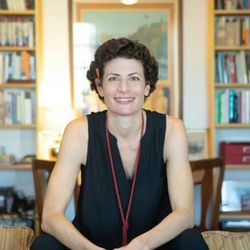
841. 841: Sandra Goldmark, part 1: Fixation: How to Have Stuff without Breaking the Planet
41:57||Ep. 841How often does something break that you know could be fixed, but you don't know how and there are no places to fix it? I remember repair stores all over the place, but the field doesn't exist any more. We all know about planned obsolescence and how products are designed to break. Now we feel we have to throw things away and replace them (after avoiding buying things when possible, which is far more than most of us practice).Enter Sandra Goldmark, as a member of a growing movement to fix things and make things fixable. She's also an Ivy League professor at Barnard and the Columbia Climate School, so, no, professors don't have to be out of touch.I met Sandra before the pandemic, at a shop she set up down by the South Street Seaport to repair things. Besides her own book Fixation, she was mentioned in a book (The Repair Revolution) in my sustainability leadership workshop alumni book club.Lest you think people have to be born fixers or educated as engineers, a preconception that I find still holds me back, she shares her background not growing up with those things. On the contrary, she found she enjoyed it and found community.Listen for a basic human approach to fixing things and changing culture.Sandra's home pageHer book, FixationHer page at Barnard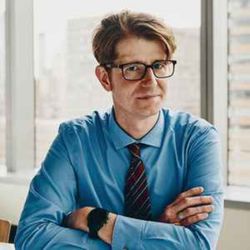
840. 840: Dr. Leonardo Trasande, part 1: Sicker, Fatter, Poorer: The Urgent Threat of Hormone-Disrupting Chemicals to Our Health and Future ... and What We Can Do About It
01:10:11||Ep. 840I found Dr. Trasande quoted in a Washington Post article The health risks from plastics almost nobody knows about: Phthalates, chemicals found in plastics, are linked to an array of problems, especially in pregnancy. He said, "Endocrine-disrupting chemicals are one of the biggest global health threats of our time ... And 2 percent of us know about it---but 99 percent of us are affected by it.”The article said that he said that "at the population level, scientists can see telltale signs that those chemicals are undermining human health, adding to growing male infertility or growing cases of ADHD." This outcome suggests a violation of this nation being founded on protecting life, liberty, and property, and the consent of the governed. I also found from this video, Food Contaminants and Additives, that he reported his results thoroughly, taking care not to venture outside his research.I had to talk to him.We talked about his research, what brought him to a new field, now burgeoning, of learning about chemicals that disrupt our endocrine systems---that is, they mess with our hormones. You'll hear that he didn't intend to go into it. It was (tragically) growing in importance since our hormone systems are becoming increasingly disrupted, as are those of many species.I should be more accurate. They aren't passively being disrupted. Consumers are paying companies to produce chemicals that do it.It sounds slimy and scary. I'd rather it didn't happen, but since it does, I'd rather know than not know. I think you would too.Dr. Trasande's NYU faculty page
839. 839: Saabira Chaudhuri: Consumed: Throwaway Plastic Has Corrupted Us
48:34||Ep. 839Reading Saabira's New York Times piece Throwaway Plastic Has Corrupted Us told me she saw more about plastic and its effect on our culture than most. A quote from it: "The social costs of our addiction to disposable plastics are more subtle but significant. Cooking skills have declined. Sit-down family meals are less common. Fast fashion, enabled by synthetic plastic fibers, is encouraging compulsive consumption and waste."Her tenure at the Wall Street Journal told me she would communicate it effectively, pulling no punches. As much as I prefer not to link to social media, this video review by Chris van Tulleken, bestselling author of Ultra-Processed People, is about as positive a review as I've seen, all the more since he clarifies that he doesn't know her.So I invited her to talk about her book Consumed: How Big Brands Got Us Hooked on Plastic. It launches today (October 7) in the US, so I've only finished the beginning, but it delivers. In our conversation, she describes what to expect when you read it, plus her back story driving her to write it.Many reviews describe her humor. You'll hear that I held back from asking her about how she worked humor into the topic, since she's not a comedian so I wouldn't expect to perform unprepared, but no worry, she made me laugh unprompted and shared more humor from the book. Obviously it's a serious topic, and Saabira's work shows how much more serious than you probably thought, but being depressed doesn't help solve it.Saabira's home pageHer New York Times piece that brought me to her: Throwaway Plastic Has Corrupted UsHer book page for ConsumedThe video review we mention by Chris van Tulleken, bestselling author of Ultra-Processed People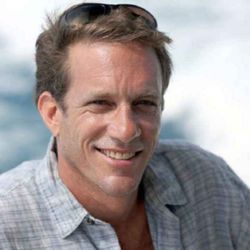
838. 838: Zach Rabinor, part 2: What if your business and values clash?
01:01:27||Ep. 838Zach and I got so into our first conversation that we had to take a second one to get to the Spodek Method.Listen for yourself, but I hear Zach working with three motivations:His surfer, outdoors self wants to conserve, protect, and enjoy nature and enable others to do the same by experiencing it.His CEO self wants to deliver what his customers want, despite what they want including polluting and depleting---that is, hurting people and wildlife---beyond what nearly anyone who ever lived has. They don't know it and his company's current message implies that they're helping, not hurting.His leadership self wants to improve himself and his work, to resolve conflict, to explore his boundaries and his team's to see if they can change the world.This situation exists in nearly everyone I know: we love humanity and nature, we live in a culture that rewards the destruction of each, and we want to help resolve that conflict. The difference with Zach is not that the stakes are higher. It's that he is willing to share this internal conflict publicly, not to hide it or act like it isn't there. Only by examining one's blind spots and vulnerabilities can one grow in the areas we care about most. Zach is out on the forefront.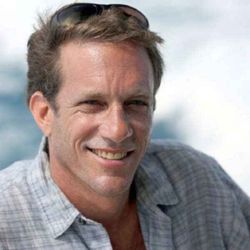
837. 837: Zach Rabinor, part 1: Getting serious about sustainable travel?
01:03:40||Ep. 837I met Zach at an event I spoke at sponsored by the Young Presidents Organization, whose members tend to be successful in business. The criteria to join require it. I knew the people would be friendly, but suspected they would pollute and deplete more than most without realizing it.Zach plays a leadership role in the local chapter and was one of the organizers for this event so we interacted more. He was open and sincere about learning about my work and sustainability leadership. As you'll hear, he runs a business that pollutes and depletes---that is, hurts people and wildlife---a lot. Like nearly all businesses that do, it portrays itself as clean and helping people stay clean while doing things that pollute and deplete.Not many people face their inner conflicts, let alone voice them publicly. I see no other way to resolve them. No one has solved the challenges Zach is choosing to face. I know they can be solved as does he, I suspect, but getting there will be hard. Restoring sustainability to his business, among the most polluting and depleting, will be hard, mostly people and cultural challenges, not technical or legislative.I see Zach as a potential pioneer. Let's see if we can help him achieve what few others are trying and most are just covering up.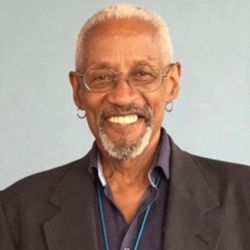
836. 836 Dr. Robert Fullilove, part 5: Unsustainability is upstream of imperialism, colonialism, slavery, and racism
01:34:47||Ep. 836Since our fourth recording, Dr. Bob and I spoke at length about what's driving me and keeping me going beyond where nearly anyone else does on sustainability leadership. We cover in this recording most of that conversation, plus we go in other directions.He shares the commonalities of what he sees in me and my work with the people he's known and worked with who are also working or worked to change the world, including Martin Luther King, Stokely Carmichael, John Lewis, and his wife, Mindy Fullilove. In the process, I end up sharing parts of my upcoming book. His experience with them, as well as working with prisoners and his experience with psychology and social work, gave me space to open up about racism and my past.This episode felt personal to me. Normally I try to showcase the guest, but his experience and demeanor ended up mentoring me. I felt like I got more out of the conversation than he did, but he said he loved it.This episode differs from most on this podcast. I suspect you'll like its openness, previews of my next book, and his warmth.